Katherine Johnson
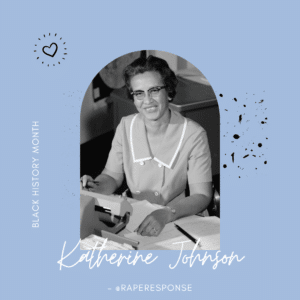
Katherine Johnson was an American mathematician who calculated and analyzed the flight paths of many spacecrafts during her more than three decades with the U.S. space program. Her work helped send astronauts to the Moon.
When she was a small child, it became apparent that she had a brilliant intelligence and amazing skill with numbers. She attended high school at the young age of 10! She then went on to graduate college at 18 years old with her bachelor’s degree in mathematics and French. While teaching in Virginia, she was selected to be one of the first three African American students to enroll in a graduate program at West Virginia University
In 1953 she started working for the National Advisory Committee for Aeronautics’ West Area Computing unit. This committee was made up of African American women who manually performed complex mathematical calculations for the engineers in the programs. NACA was then formed into NASA. As a member of NASA, Katherine was a member of a space task group. She would then go on to coauthor a paper with an engineer about the calculations of placing a spacecraft into orbit in space. She became the first woman in her division to receive credit as an author of a research report. In 2015, Katherine Johnson was awarded the Presidential Medal of Freedom by President Obama, the highest civilian honor. In 2016 the popular film, Hidden Figures, helped to share her story. Katherine was portrayed by Taraji P. Henson. If you’re interested in learning more about this incredible woman, read this article or check out the movie!
Source: https://www.nasa.gov/content/katherine-johnson-biography
Recy Taylor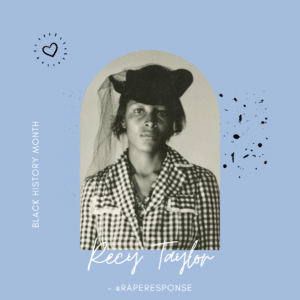
Recy Taylor was an African American woman whose sexual assault case made headlines in the 1950s. Recy was born in Abbeville, Alabama in the Jim Crow era of the Southern States in America. She worked as a sharecropper with her family.
Her life drastically changed when she was walking home from attending a church service. On September 3, 1944, Recy was kidnapped while leaving church and gang raped by six white men. Despite the men’s confessions to authorities, two grand juries subsequently declined to indict the men; no charges were ever brought against her assailants.
In 2011, Recy received a formal apology made on behalf of the state about what happened to her, and for the handling of the case. In a documentary about her assault, “The Rape of Recy Taylor,” she stated that she would’ve liked an apology from her attackers, but sadly she never got one. Recy’s refusal to remain silent about a brutal rape she suffered, perpetrated by white men, led to an organization in the African American community to fight for justice and civil rights.
Source: https://www.womenshistory.org/education-resources/biographies/recy-taylor
Rosa Parks
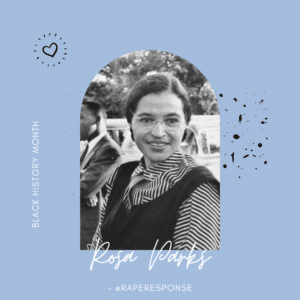
Rosa Parks was a civil rights activist that played a very important role during the Civil Rights Movement. Rosa was born in Tuskegee, Alabama on February 4th, 1913. She worked as an assistant and activist for the NAACP.
One of the moments Rosa Parks is most known for is the Montgomery Bus Boycott. Rosa was chosen to lead demonstrations on the segregated buses in Alabama. In these days, African Americans were required to give up their seat if a white passenger needed a seat. One day, Rosa refused to vacate her seat for a white man once the “whites only” section was full. Rosa was arrested over her refusal. Her arrest led to African Americans boycotting the bus system in Alabama for over a year. That boycott caused the bussing system to lose hundreds of thousands of dollars and was a monumental moment in the Civil Rights Movement.
A lesser known part of Rosa Parks’ life was her advocacy for survivors of sexual assault. She visited Recy Taylor after her attack and provided support. She was one of the people to try to help get her assault brought to the courts and in the media. She helped Recy find her voice to speak up and speak out against the assault. Rosa would then disclose that she was almost sexually assaulted by a white man. She wanted to make sure that others had a voice and could get help and support regardless of their skin color.
Source: https://www.history.com/topics/black-history/rosa-parks
Chardonnay Madkins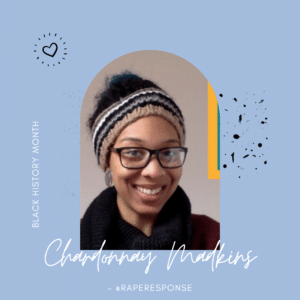
Chardonnay Madkins is a strong and intelligent woman that has lately been connecting pop culture to pressing societal issues (homophobia, racism, sexism, etc.). She is an amazing writer, speaker, and currently a great activist for many social issues our country is facing. Chardonnay is helping to make history for the work she is currently doing.
Her story became known when she was assaulted two times. One on a historically black college campus and the other on a campus that was not a historically black college. She was not helped as much as she should have been. She was persuaded to drop her complaints by the historic black college to protect the fellow black student that sexually assaulted her.
After not getting the help that she need from the campus, Chardonnay began to speak out about why it’s harder for African American women to report sexual assaults at historically black colleges and universities. Chardonnay is currently a project manager for End Rape on Campus, an organization that seeks to reform how assaults are handled on college campuses. She is also working to bring more attention to the role race can play in the handling of campus sexual assaults, and the distinct difficulties black women can face.
Source: https://www.latimes.com/politics/la-na-pol-black-women-sexual-assault-20170828-story.html
Marsha P Johnson
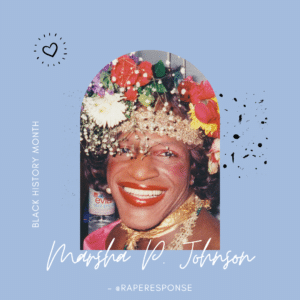
Marsha P. Johnson was an activist, considered to be the mother of drag queens, and a dedicated fighter against systems of oppression and bias. She was a prominent figure in the Stonewall Uprising of 1969. Marsha went by “Black Marsha” before settling on Marsha P. Johnson. The “P” stood for “Pay It No Mind,” which is what Marsha would say in response to questions about her gender.
Marsha is widely known for her activism during the Stonewall Riots, which sparked the beginning of the Pride movement in the United States during 1969. After the Stonewall Riots, parades later deemed as “Pride Parades” happened to commemorate the riots, celebrate the progress we have made for our LGBTQ+ friends, but to also remind us of the work we still have left to do.
Marsha created the Street Transvestite Action Revolutionaries, also known as STAR, with her friend Sylvia. STAR is a group that is committed and dedicated to supporting transgender youths that are experiencing homelessness in New York City. To this day, Marsha is a prominent figure and activist in the LGBTQIA+ community. To read more about this incredible woman, click here or check out her documentary on Netflix!
Source: https://marshap.org/about-mpji/
Article by Jasmine Adams



